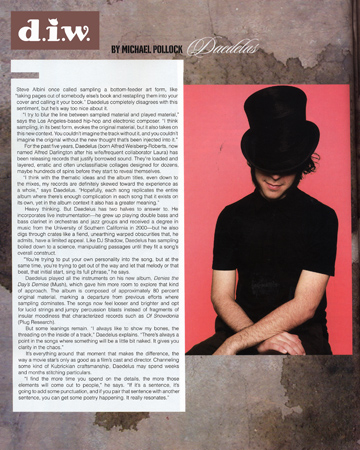
BEAT CONDUCTORS & SAMPLE SALESMEN
Steve Albini once called sampling a bottom-feeder art form, like “taking pages out of somebody else’s book and restapling them into your cover and calling it your book.” Daedelus completely disagrees with this sentiment, but he’s way too nice about it.
“I try to blur the line between sampled material and played material,” says the Los Angeles-based hip-hop and electronic composer. “I think sampling, in its best form, evokes the original material, but it also takes on this new context. You couldn’t imagine the track without it, and you couldn’t imagine the original without the new thought that’s been injected into it.”
For the past five years, Daedelus (born Alfred Weisberg-Roberts, now named Alfred Darlington after his wife/frequent collaborator Laura) has been releasing records that justify borrowed sound. They’re loaded and layered, erratic and often unclassifiable collages designed for dozens, maybe hundreds of spins before they start to reveal themselves.
“I think with the thematic ideas and album titles, even down to the mixes, my records are definitely skewed toward the experience as a whole,” says Daedelus. “Hopefully, each song replicates the entire album, where there’s enough complication in each song that it exists on its own, yet in the album context it also has a greater meaning.”
“You’re trying to put you own personality into the song, but at the same time, you’re trying to get out of the way and let that melody or that beat, that initial start, sing its full phrase,” he says.
Daedelus played all the instruments on his new album, Denies the Day’s Demise (Mush), which gave him more room to explore that kind of approach. The album is composed of approximately 80 percent original material, marking a departure from previous efforts where sampling dominates. The songs now feel looser and brighter and opt for lucid strings and jumpy percussion blasts instead of fragments of insular moodiness that characterized records such as Of Snowdonia (Plug Research).
But some leanings remain. “I always like to show my bones, the threading on the inside of a track,” Daedelus explains. “There’s always a point in the song where something will be a little bit naked. It gives you clarity in the chaos.
It’s everything around that moment that makes the difference, the way a movie star’s only as good as a film’s cast and director. Channeling some kind of Kubrikian craftsmanship, Daedelus may spend weeks and months stitching particulars.
“I find the more time you spend on the details, the more those elements will come out to people,” he says. “If it’s a sentence, it’s going to add some punctuation, and if you pair that sentence with another sentence, you can get some poetry happening. It really resonates.”
MICHAEL POLLOCK